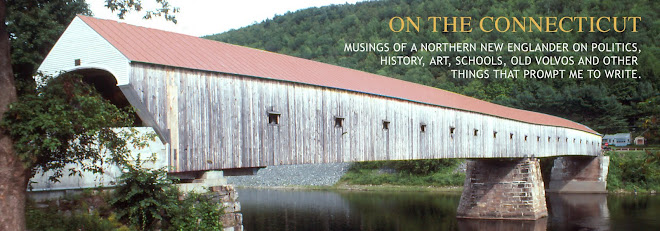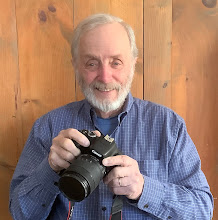Photographing barns has been my passion for years. At last count I had close to 10,000 photographs of barns throughout the northeastern United States, plus some in Virginia, West Virginia, Kentucky, Ohio, Indiana, Michigan, California, Arizona and the Province of Quebec
Quebec has hundreds of lovely little villages, each with a well-maintained church and many with colorfully painted barns. For my first photographic expedition across the border, I planned to photograph round and multi-sided barns. I studied old books, magazines and tourist guides. I found eight near the border and made notes of their location.
 Mansonville
MansonvilleMy wife and I set off from our summer camp in northern Vermont early one summer morning. An hour later, we crossed the border at Derby Line and stopped at the visitor center for a map. A pleasant guide apologized that she had run out of provincial maps, but she was kind enough to give us a photocopy.
Using my notes, I located the towns that had round barns on the map and plotted a route that would take us to all eight.
 Barnston
BarnstonThe first five took about six hours, including a picnic lunch overlooking beautiful Lake Massawippi. The farmers were gracious about letting me tramp around their barnyards snapping photos from various angles. I speak very little French; but most of the people in southern Quebec are bilingual and very friendly, so communication was not a problem.
The sixth barn took nearly two hours to find, but it was well worth the trip. It was part of a beautiful hilltop farm with a spectacular view. I got some great shots, but it was almost five o’clock in the afternoon by the time I was done.
 West Brome
West BromeBack in the car, I looked at the map and then at my wife. “The next one is in St. Jacques la Majeur de Wolfston,” I announced in my best French accent. “It doesn’t look that far. Should we try one more before supper?”
“If you think we can make it.”
“It can’t be more than an hour and a half. Maybe two hours at the most.” I pointed to the location on the map. “It’s right here. And there’s plenty of daylight left.”
Two and a half hours later, I began to realize just how much the photocopied map had been reduced. Chris studied it closely.
“This scale of miles is pretty tiny. I think it might be farther than you think,” she said with an unmistakable hint of sarcasm.
We followed a winding secondary road. The scenery was gorgeous—miles and miles of forested wilderness, small mountains and spectacular views.
 Ayers Cliff
Ayers CliffWhen we finally reached St. Jacques, it was after eight o’clock and the sun was close to dropping behind the mountains. I had no idea where the barn was. There was nothing in the town but a tiny church and three houses. One of them had a small store in the front room.
I pulled up in front of the store and went inside. The two teenage girls behind the counter smiled.
“Bonjour. Could you tell me where I could find the round barn in town?”
The two girls stared at me blankly. After a long silence, I realized they couldn’t understand me.
“Parlez-vous anglais?”
They giggled and shook their heads no. Another long silence.
I couldn’t think of the word for barn. I remembered farm was ferme and round was rond.
“Rond ferme?,” I asked.
The girls looked puzzled.
"Rond ferme,” I repeated, this time slower and louder and accompanied by drawing circles in the air with my hands.
They looked at each other. It was obvious they had no idea what I was talking about. They weren’t deaf. They just didn’t understand.
I had no more than twenty or twenty-five minutes before the sun went down, and I had come too far to go home empty handed. So, I ran out to the car to get a tourist booklet with a picture of a round barn. I took it inside and showed it to the girls.
They took the booklet and walked into the back part of the house. I could hear people talking in French. There was much laughter.
The girls reappeared. The one carrying the booklet walked out onto the porch beckoning me to follow. Once outside, she pointed across the valley.
“Over there,” she said, mimicking my slow and loud delivery.
There on a hillside about a half-mile away was the barn.
She pointed to a dirt road across from the church and handed me the booklet.
“Bonjour. Merci.” I said awkwardly.
Within a few minutes, I was pulling into the driveway of the neat little farm. Luck was with me. Situated on a western slope, the barn was still in bright sunlight. It was not round but six-sided.
 St. Jacques le Majeur
St. Jacques le MajeurI knocked on the door, camera in hand. A woman appeared behind the screen door.
“Bonjour. Would you mind if I photographed your barn?”
The woman stared at me with the same blank expression. Another long silence.
I was running out of time. I pointed to my camera and then to the barn.
“Photograph?”
She nodded her head yes.

I walked out by the barn, set up my tripod and snapped a picture. I looked back at the house to find the woman and a child standing on the lawn watching me. I worked my way around the barn, taking pictures from different angles. Each time I glanced back at the house, there were more people. My wife was doing her best to be invisible as she sat in the car reading.
A pickup truck pulled into the driveway. A man and woman got out and joined the group. By the time I was halfway around the barn, a group of several adults and children were watching and chattering in French.
I finished the roll of film and walked back to the car. My audience was gone, but the woman was standing in the door watching me.
“Merci,” I said with a smile as I put my camera on the back seat and climbed into the car.

An hour and a half later, we were driving down the main drag in Sherbrooke, tired and hungry and looking for some place to eat. I wonder how many families in St. Jacques le Majeur were talking about the odd American photographer.














